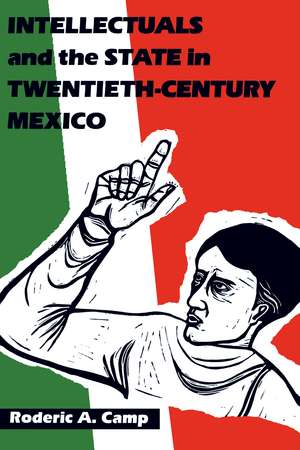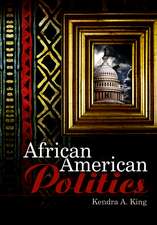Intellectuals and the State in Twentieth-Century Mexico: LLILAS Latin American Monograph Series
Autor Roderic Ai Campen Limba Engleză Paperback – 1986
Din seria LLILAS Latin American Monograph Series
-
 Preț: 334.78 lei
Preț: 334.78 lei -
 Preț: 123.28 lei
Preț: 123.28 lei -
 Preț: 158.95 lei
Preț: 158.95 lei -
 Preț: 197.60 lei
Preț: 197.60 lei -
 Preț: 224.14 lei
Preț: 224.14 lei -
 Preț: 199.89 lei
Preț: 199.89 lei -
 Preț: 263.34 lei
Preț: 263.34 lei -
 Preț: 160.09 lei
Preț: 160.09 lei -
 Preț: 198.73 lei
Preț: 198.73 lei -
 Preț: 200.06 lei
Preț: 200.06 lei -
 Preț: 240.63 lei
Preț: 240.63 lei -
 Preț: 198.52 lei
Preț: 198.52 lei -
 Preț: 199.89 lei
Preț: 199.89 lei -
 Preț: 198.90 lei
Preț: 198.90 lei -
 Preț: 198.90 lei
Preț: 198.90 lei -
 Preț: 305.21 lei
Preț: 305.21 lei -
 Preț: 200.66 lei
Preț: 200.66 lei -
 Preț: 280.43 lei
Preț: 280.43 lei -
 Preț: 200.28 lei
Preț: 200.28 lei -
 Preț: 200.42 lei
Preț: 200.42 lei -
 Preț: 198.90 lei
Preț: 198.90 lei -
 Preț: 158.36 lei
Preț: 158.36 lei -
 Preț: 200.28 lei
Preț: 200.28 lei -
 Preț: 232.88 lei
Preț: 232.88 lei -
 Preț: 225.50 lei
Preț: 225.50 lei -
 Preț: 160.48 lei
Preț: 160.48 lei -
 Preț: 158.75 lei
Preț: 158.75 lei -
 Preț: 199.51 lei
Preț: 199.51 lei -
 Preț: 240.05 lei
Preț: 240.05 lei -
 Preț: 282.17 lei
Preț: 282.17 lei -
 Preț: 280.59 lei
Preț: 280.59 lei -
 Preț: 282.17 lei
Preț: 282.17 lei -
 Preț: 200.66 lei
Preț: 200.66 lei -
 Preț: 198.90 lei
Preț: 198.90 lei -
 Preț: 239.87 lei
Preț: 239.87 lei -
 Preț: 198.90 lei
Preț: 198.90 lei -
 Preț: 232.29 lei
Preț: 232.29 lei -
 Preț: 159.51 lei
Preț: 159.51 lei -
 Preț: 231.70 lei
Preț: 231.70 lei -
 Preț: 199.89 lei
Preț: 199.89 lei -
 Preț: 241.02 lei
Preț: 241.02 lei -
 Preț: 200.26 lei
Preț: 200.26 lei -
 Preț: 263.93 lei
Preț: 263.93 lei -
 Preț: 158.20 lei
Preț: 158.20 lei -
 Preț: 223.56 lei
Preț: 223.56 lei -
 Preț: 198.89 lei
Preț: 198.89 lei -
 Preț: 160.27 lei
Preț: 160.27 lei -
 Preț: 225.50 lei
Preț: 225.50 lei -
 Preț: 241.38 lei
Preț: 241.38 lei -
 Preț: 299.28 lei
Preț: 299.28 lei
Preț: 240.63 lei
Nou
Puncte Express: 361
Preț estimativ în valută:
46.04€ • 48.07$ • 38.11£
46.04€ • 48.07$ • 38.11£
Carte tipărită la comandă
Livrare economică 05-19 aprilie
Preluare comenzi: 021 569.72.76
Specificații
ISBN-13: 9780292738393
ISBN-10: 0292738390
Pagini: 296
Dimensiuni: 152 x 229 x 15 mm
Greutate: 0.45 kg
Editura: University of Texas Press
Colecția University of Texas Press
Seria LLILAS Latin American Monograph Series
ISBN-10: 0292738390
Pagini: 296
Dimensiuni: 152 x 229 x 15 mm
Greutate: 0.45 kg
Editura: University of Texas Press
Colecția University of Texas Press
Seria LLILAS Latin American Monograph Series
Notă biografică
Roderic A. Camp is McKenna Professor of the Pacific Rim at Claremont McKenna College.
Cuprins
- Acknowledgments
- 1. Introduction
- Methodology
- 2. Politics, the State, and Intellectuals
- The Mexican Model
- Political Culture
- Political Structures
- Nonstate Structures
- Conclusions
- 3. The Mexican Intellectual
- A Universal Conceptualization
- A Mexican Intellectual’s Definition
- A Mexican Public Figure’s Definition
- Conclusions
- 4. The Function of the Mexican Intellectual
- Social Conditions and the Intellectual’s Role
- Foreign Determinants of Intellectual Roles
- Cultural Determinants of Intellectual Roles
- The Role of the Mexican Intellectual
- A View from Intellectuals and Politicians
- Conclusions
- 5. Family Background and Education
- Consequences of Birthplace
- Consequences of Residence
- Consequences of Social Background
- Consequences of Education
- Conclusions
- 6. Career Patterns
- Occupations: Uncommon Choices
- Occupations: Frequent Choices
- Career Choices and Public Service
- Other Experiences
- Conclusions
- 7. Intellectual Mentors and Circles
- The Intellectual Mentor
- The University and Recruitment
- The Journal and Recruitment
- The Role of Intellectual Circles
- The Independent Intellectual
- Some Important Intellectual Groups
- Conclusions
- 8. Cultural Academies and Institutions
- The Importance of Mexican Cultural Institutions
- The Academies
- National Prizes
- The Universities
- Conclusions
- 9. Media, Censorship, and Intellectual Life
- Media Impact
- Characteristics of Mexican Media
- Government Censorship
- Self-Censorship
- Government Censorship Techniques
- Conclusions
- 10. Serving the State
- The Consequences of 1968
- Patterns of Intellectual Relationships to the State
- Why Intellectuals Have Served the State
- Consequences of Serving the State
- 11. Conclusions
- Notes
- Bibliographic Essay
- Index
Descriere
Roderic Camp’s examination of intellectuals in Mexico is the first study of a Latin American country to detail the structure of intellectual life, rather than merely considering intellectual ideas.












